The Promised Messiahas had prophesied in January 1891 in his book Victory of Islam:
‘Truth will prevail. A new bright day will dawn again for Islam. Same as it did before. The sun of Islam will rise in full bloom, same as it did before. But this will not be at once. Imperative it is that this should not happen until we have proved our worth by devoted hard work, by offering our life-blood, by sacrificing our rest and peace, by accepting all indignities for the dignity of Islam. The new Life of Islam demands a great Sacrifice from us. What is this Sacrifice? It is our lives: on this Sacrifice depends now the Life of Islam, the Life of Mussalmans, the Manifestation of God in our time.’[1]
The very next year on 27th December 1892, the Ahmadiyya community held its second annual convention at Qadian, Dar-ul- Amaan [The Centre of Peace]. More than 300 members of the community attended the Jalsa, its main objective was highlighted through an advertisement on 7 December 1892, as follows:
“One of the exigencies of the Convention is to put forward sound policies for the religious benefit of Europe and America. It is a proven fact that the fortunate people of Europe and America are getting ready to accept Islam but are alarmed by the religious divisions in Islam. Thus, recently I received from an Englishman a letter which stated: “You show mercy towards all living beings, but we are also humans and deserve mercy because we have accepted Islam. But we are still ignorant of its true and correct teachings.” Therefore, brothers! Understand it well that this group is getting ready for us. God never abandons any sincere one outside a community. With Allah’s command and wish, the blessings of truth will attract them all to this side. Allah has decreed this in the heavens, and no one can change it.”[2]
On the second day of this annual conference of the Ahmadiyya community held on 28th December 1892, a Consultation meeting was held where the participants gave their suggestions regarding the propagation of Islam in the West.
The following conclusions were reached.
1. A magazine about Islam should be distributed freely in Europe and America
2. A printing press should be established in Qadian.
3. A newspaper should be published by the Jamaat
4. Hazrat Maulana Syed Muhammad Ahsan Amrohi should be appointed as a preacher who would journey throughout India propagating the message of Islam Ahmadiyyat.
5. A committee be set up to look after the arrangements of the annual convention presided over by Hazrat Hakim Maulvi Nuruddinra.
In the proceedings of this convention, it is written:
‘On 28 December 1892, respected guests gave their suggestions for the religious benefit of Europe and America and it was decided that a magazine setting out the complete teachings of Islam and reflecting the beautiful features of Islamic beliefs should be compiled and printed. Many copies should be sent to Europe and America…. In future as well, the purpose of these yearly conventions should remain the same, i.e. that proposals should be put forth for the propagation of Islam and as an act of kindness for the new Muslims from America and Europe… To achieve these objectives and for various other administrative purposes, a committee was established. Hazrat Maulwi Nooruddin Sahib Bhairwi was appointed as the president and Mirza Khuda Bakhsh Sahib as General Secretary. Respected tutor Janab Khan Sahib, Mr Muhammad Ali Khan, Chief Maleer Kotla, and Sheikh Rahmatullah Sahib, Municipal Commissioner Gujarat, Munshi Ghulam Qadir Sahib, Vice President and Municipal Commissioner Sialkot, and Maulwi Abdul Kareem Sialkoti Sahib were elected as members.’[3]
In accordance with the Consultation guidance, the Promised Messiahas decided to establish a magazine named The Review of Religions. Although the Promised Messiah’s as message had reached the west as early as 1885 when he claimed to be the reformer of the age he was deeply concerned for the propagation of Islam in the west. To this end, he placed the following advertisement on 15th January 1901:
An Important Proposal
In the Name of Allah, the Gracious, the Merciful
“This fact had always been a cause of grave concern for me that all the truths, pure knowledge and satisfying strong arguments in favour of the religion of Islam and the ways to bring peace to the human soul revealed to me and that are still being revealed to me, have not yet benefited the educated people of this country and the seekers of truth in Europe. This anguish was so great that it became unbearable. But Allah wants to complete my mission before I depart this transitory world. My final journey will not be one of disappointment. Today, some friends have turned my attention towards starting a magazine in the English language by publishing articles I had written in the support of Islam to serve the aforementioned purpose. It would also be possible to publish religious and secular articles written by others subject to our acceptance for publication.”[4]
The Promised Messiahas appointed Maulwi Muhammad Ali, and Khawaja Kamaal-ud-din, as the editors of the Magazine and asked the members to come to Qadian in order to discuss the funding of the magazine and suggested perhaps it could be run on a commercial basis with participating shareholders as its members. The Promised Messiahas stated:
“It seems advisable that a committee of members is established, this matter is debated, and the best method is adopted. But let it be clear that I will not intervene in the administration of the finances. Perhaps it should be run on a commercial basis with participating shareholders as its members. The funds would be deposited in a bank in the manner proposed and determined by the members.”[5]
The Promised Messiahas further writes: “But since such matters cannot be settled through advertisements, I have thought it preferable that the day of Eid-ul-Azhia be chosen for this meeting. On that day, as far as possible, our friends should try to reach Qadian and the issue of how the capital is to be raised and employed can be deliberated by a majority decision of those attending this meeting. Everyone should be ready to give suggestions. Remember that this contribution would solely be on a commercial basis and that everyone who contributes would have his due rights in this business based on the capital invested. All aspects would be discussed during the meeting.”[6]
According to the instructions of the Promised Messiahas the members of the community gathered at Qadian on the occasion of Eid ul Azha and gave their suggestions. It was decided that instead of a single magazine, an association under the guardianship of the Promised Messiahas should be established to propagate the message of Islam in English. Various books as well as this magazine would be published according to the need of the time. The members named this association as ‘Anjuman Ishat Islam’ (A Body for The Propagation of Islam).
The opening ceremony of ‘Anjuman Ishat Islam’ was held in Aqsa Mosque Qadian after the Zuhur prayers on 31st March 1901, The Promised Messiahas delivered the first speech on the importance of this huge task. The second meeting was held on the 1st April 1901 where the board of directors and other important responsibilities were decided.
The Promised Messiahas (The Head)
Hazrat Maulvi Norrudeen (The President)
Maulvi Abdul Kareem Sahib Sialkoti (Vice President)
Khawaja Kamaludeen Sahib (Secretary)
Maulvi Muhammad Ali (Assistant Secretery)
Sheikh Rehmatullah Sahib (Financial Secretary)[7]
The First Issue of the Review of Religions
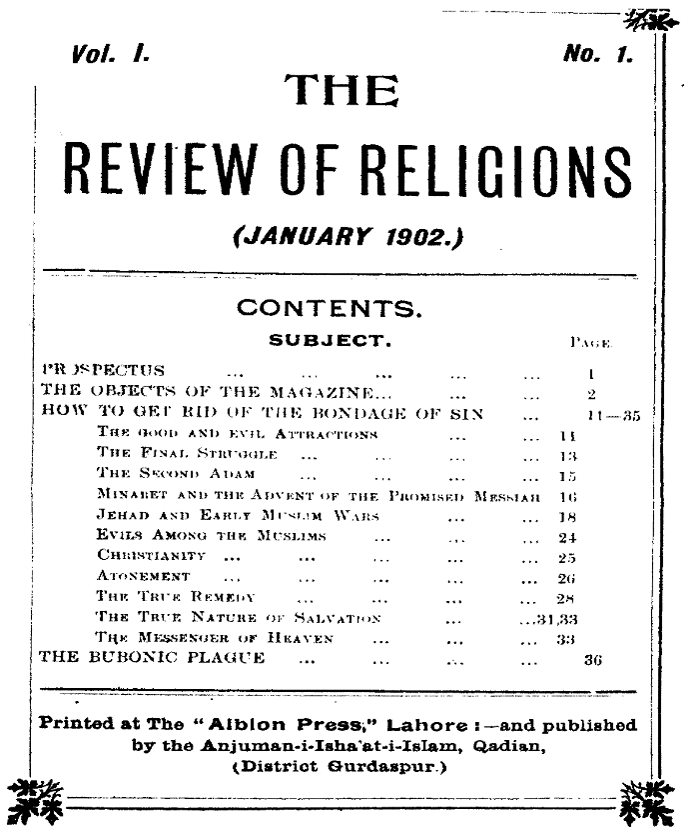
Translations of the articles of Promised Messiahas, his new prophecies and the news of the Ahmadiyya Muslim Jamaat were published in this magazine. By the Grace of Allah, this magazine achieved renown non only in India, but in many parts of the world. The magazine also reached Britain during the lifetime of the Promised Messiahas and in those terms the magazine could be considered as the ‘first missionary’ to the United Kingdom.
The Review of Religions had an immediate impact on the British public who not only read it but also corresponded with its Editor. One such example is of an English lady Miss S.N. Ridgway from Manchester who wrote letters to the editor about the Review of Religions magazine on the 20th of February 1905.
Miss S.N. Ridgway also wrote to the Promised Messiahas. Her letter was published on page 3 of Badar Newspaper on the 25th of May 1905.
She writes: “Dear Mirza Ghulam Ahmad, at first when I read about you, I desired to write to you. But I couldn’t think of anything and what may I write to a man like the Promised Messiahas. I have read some of your teachings in the papers of Review of Religions which are regularly sent to me from Qadian. I am happy that the truth of God is being established. The pure faith which was preached by Jesusas and Muhammadsa is forgotten by the world. But the time has come about which God said he would vigorously shake up the world. Now everything seems as if it is changing the religious world as well as the secular world. I was pleased to know that you preach of peace and coherence. I always used to doubt how true religion can be spread by the sword. There is not a doubt that it is permitted only for self defence. I am pleased to know that you live under a British rule where you have the right to freedom of thought and expression…..I have also read about a prophecy which you made 25 years ago. I am delighted to read the virtuous teachings mentioned in the Review of Religions and I hope that you will be successful in your work of spreading the truth.”[8]
Your Servent in the work of God
S.N Rigway
Abdullah Quilliam
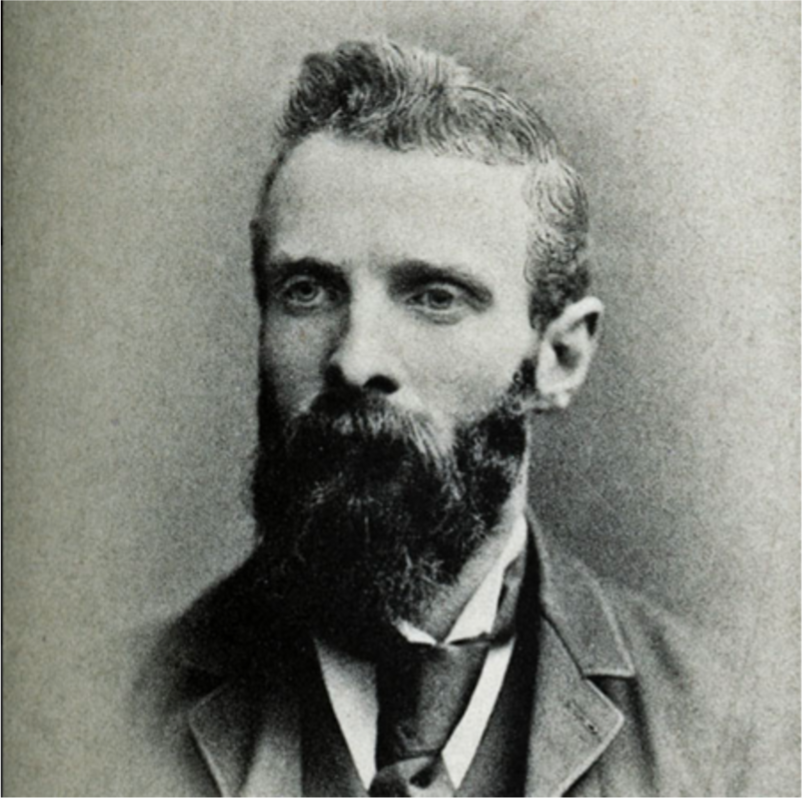
Abdullah Quilliam, a solicitor from Liverpool is known as the most influential early converts to Islam in the British Isles. His travel to Morocco in 1877 became a means of him accepting Islam. He returned to the UK and thought of ways to preach Islam to a society who had only been fed lies and fabrications about Islam. While delivering a speech in Cairo in 1928 about his conversion and the difficulties he had to face:
He said:
“When I returned to England, I became preoccupied with thinking about what Dawah methods would be appropriate to use when inviting people to accept Islam and to convince them of the truth of the deen. I was aware that the English people were already filled with a hostility towards Islam which had been fed to them by European anti-Islam ideologists. This was a strong barrier in my way, which prevented me from openly exchanging my ideas and views with English people. If you talk to English people about Islam, they think you are talking to them about some heathen religion.”[9]

Khalid Sheldrake’s article which was published in the Review of Religions in July 1912 also points towards the ignorant and misinformed West about Islam. Quilliam later published a small pamphlet The Faith of Islam in 1899 to explain fundamental tenants and a brief history of Islam. He also edited a weekly newspaper The Crescent from 1893 to 1908 which was publicized internationally, and a monthly journal named Islamic World.
Many famous personalities embraced Islam due to Abdullah Quilliam’s influence: Professor Nasrullah Warren, Professor Haschem Wilde and Resched P.Stanley who had been the Mayor of Staleybridge. Quilliam’s propagation led to around 600 people in the UK embracing Islam, many of them very educated and prominent individuals in British Society, as well as ordinary men and women.
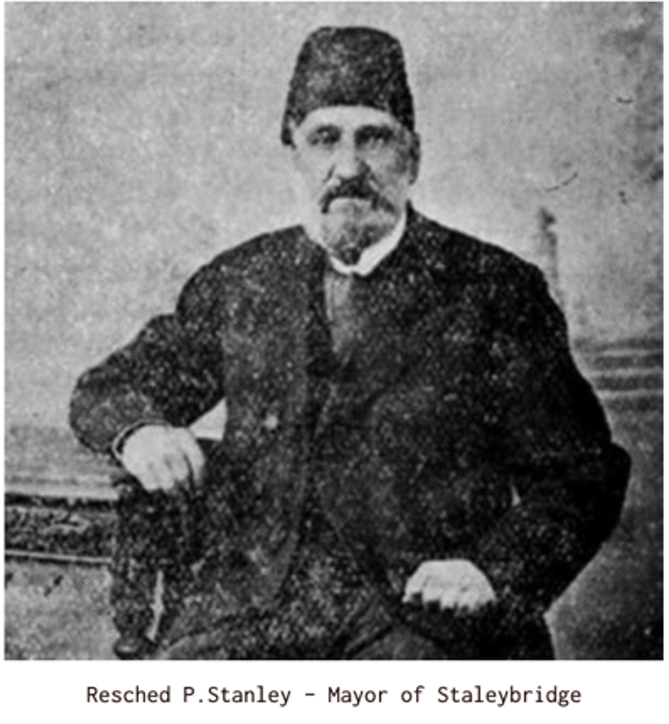
For this reason, the Promised Messiahas praised Abdullah Quilliam when comparing him to Alexander Russel Webb:
“According to us Abdullah Quilliam is far better than him who has formed a Jammat (Community) of Muslims.”[10]
The Review of Religions served to stimulate the interest of British people in Islam and provided a new perspective about its teachings. Abdullah Quilliam frequently wrote about the Review of Religions and published the contents of the magazine each month. On the 16th of September 1903 he wrote:
“The August number of the Review of Religions published at Qadian, India, is full of interesting matter. The article refuting charges made by the ignorant Christians with reference to our Holy Prophet is one of the ablest we have ever read upon the subject, and cordially commend it our readers attention”[11]
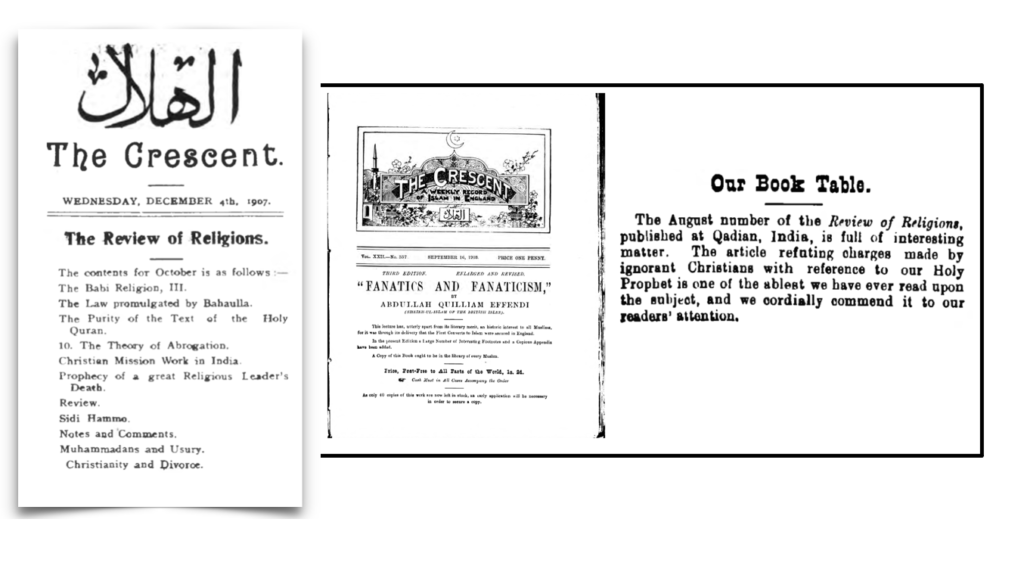
Similarly, on October the 23rd 1902 an article which was published in the July 1902 Issue of the Review of Religions titled ‘The Paraclete’ was republished by Abdullah Quilliam in his newspaper ‘The Crescent’.
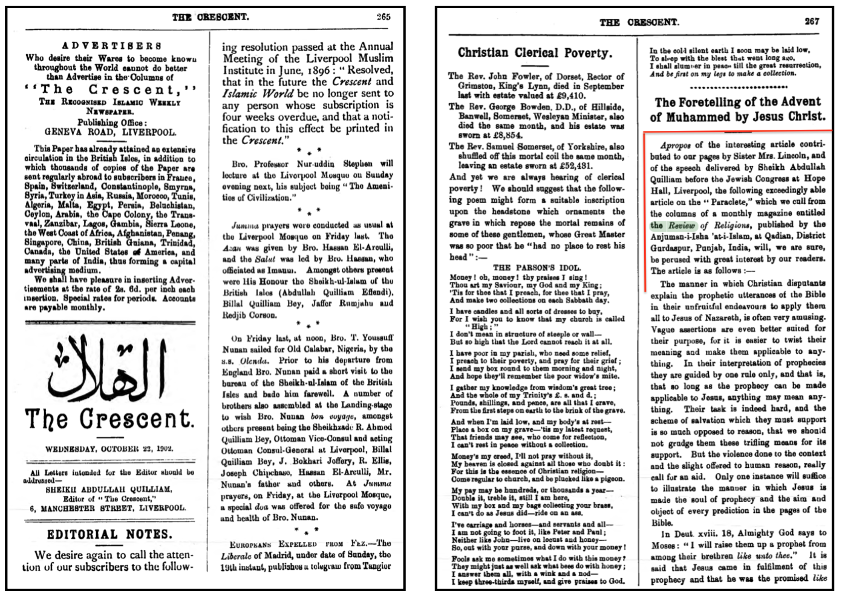
Due to financial difficulties Quilliam could not distribute his journal at free cost to all. He requested a number of copies of the ‘Review of Religions’ magazine in 1905 in order to provide free literature and magazines to new converts to Islam and to those interested in this faith, The Ahmadiyya community was devoted to spread the message of Islam in the West and had announced the delivery of the magazine at no cost for sincere readers. The November 1905 Issue of the Review of Religions mentions:
‘Learning of the free offer of our journal to inquirers in Europe, America, Japan and other countries, Sheikh Abdullah Quilliam, Sheikh-ul-Islam of the British Isles, writes to us:
“I enclose you a preliminary list of a few persons who I feel sure would greatly appreciate your offer of supplying your journal free. I only wish that we could offer to do the same with our journals, the Crescent and Islamic World, but unfortunately our funds do not permit, in fact we run both our papers at a loss and we find it most difficult to get subscriptions in for the same. As for contributions to the maintenance of the work here, we do not receive any from abroad and have not done so for many years. I understand that there are people in India who are professing to make collections for the Liverpool Muslim Institute. All I have to say is that such persons are utterly unauthorised by us so to do and that no funds are being remitted to us and have not been for many years now last past.”[12]
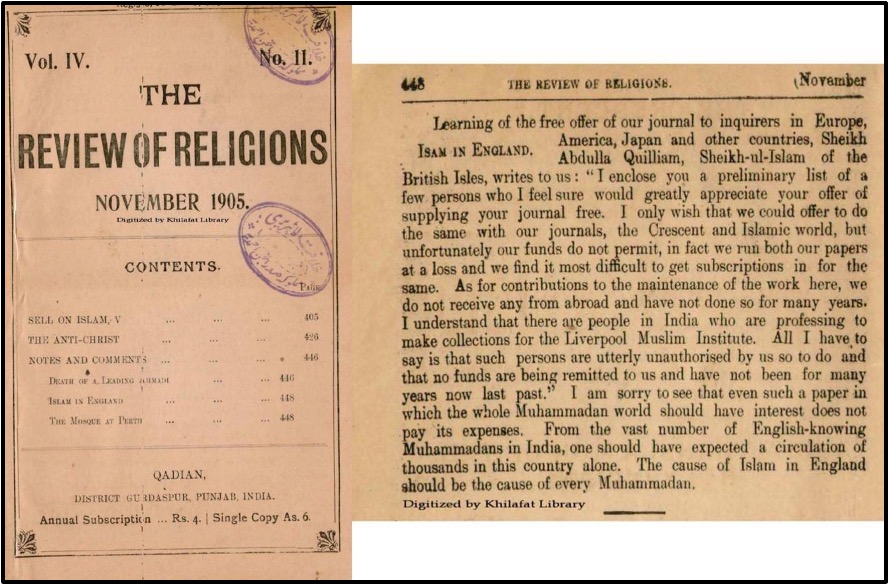
The death of Lord Stanley of Alderley, a convert to Islam was reported in the Review of Religions February 1904 and an account of his funeral and burial was quoted from The Crescent. This is as follows.
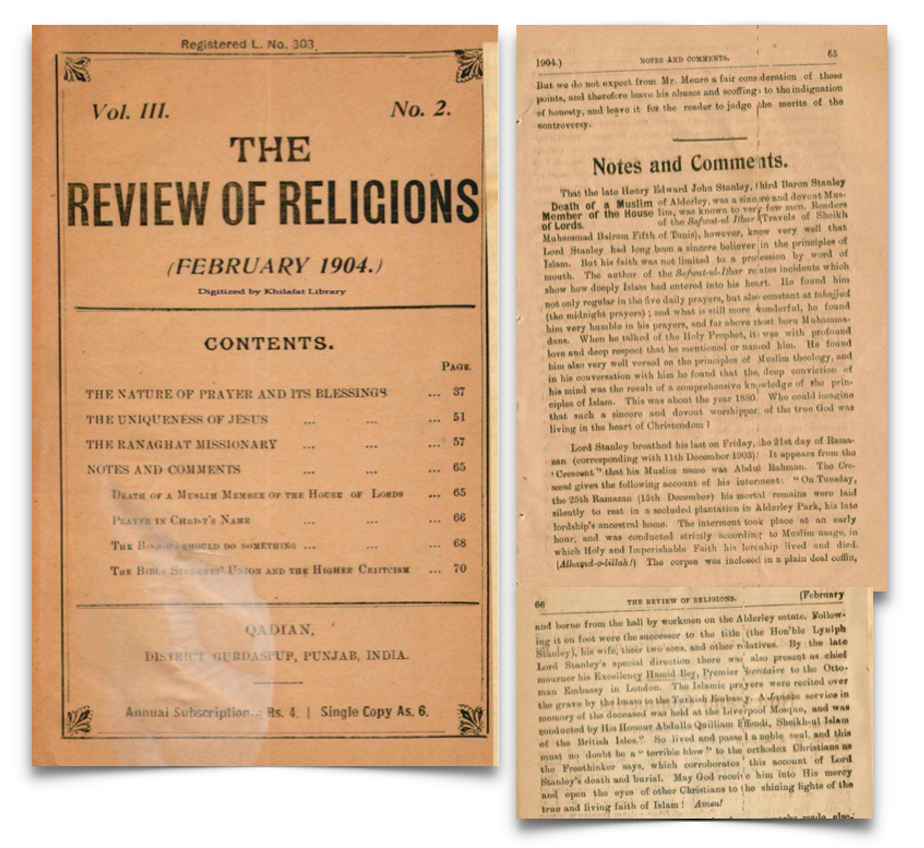
Death of a Muslim member of the House of Lords
“That the late Henry Edward John Stanley, third Baron Stanley of Alderley, was a sincere and devout Muslim, was known to very few men. Readers of the Safwat-ul-Itbar (Travels of Sheikh Muhammad Bairam Fifth of Tunis), however, knew very well that Lord Stanley had long been a sincere believer in the principles of Islam. But his faith was not limited to a profession by word of mouth. The author of the Safwat-ul-Itbar relates incidents which show how deeply Islam had entered into his heart. He found him not only regular in the five daily prayers, but also constant at tahajjud (the midnight prayers); and what is still more wonderful, he found him very humble in his prayers, and far above most born Muhammadans. When he talked of the Holy Prophetsa, it was with profound love and deep respect that he mentioned or named him. He found him also very well versed on the principles of Muslim theology, and in his conversation with him he found that the deep conviction of his mind was the result of a comprehensive knowledge of the principles of Islam. This was about the year 1880. Who could imagine that such a sincere and devout worshipper of the true God was living in the heart of Christendom? Lord Stanley breathed his last on Friday, the 21st day of Ramadan (corresponding with 11th December 1903). It appears from the “Crescent” that his Muslim name was Abdul Rahman.”[13] Thus, the Review of Religions played a pivotal role in communicating Islam to the west under direct guidance of the Promised Messiahas.
It may be a surprise to some that despite the suggestions for the magazine given in December 1892 it took almost ten years for the community to have its first issue published in January 1902. This demonstrates the struggle and financial strain that the community faced in order to propagate the message of Islam, it also explains the exhortation and the emphasis given by the Promised Messiahas in his book The victory of Islam with regards to the five dispensations suggested for the propagation of Islam, the second branch which is the publication of leaflets on Islamic truths and arguments.
Shortly after its inception the following message of the Promised Messiahas was published in the Urdu Review of Religions, September 1903, as an appendix:
‘As my community knows, God’s real purpose in sending me is to remove all the misconceptions and misleading teachings of Christianity and to bring people from all over the world to the true religion. To achieve the above-mentioned purpose, also called ‘the breaking of the Cross’ in the traditions of the Holy Prophet(sa), an English magazine, the Review of Religions, has been started. It has been published in many areas of America and Europe and it has begun to influence many hearts. Its popularity exceeds expectations and people eagerly await each issue. But permanent funding for the publication has been insufficient. If, God forbid, this magazine ceases to exist as a result of a lack of interest of this community then this would be a cause for mourning for the community. Therefore, I urge the sincere members of my community to provide as much support and financial assistance as may be possible for them.’
The Review of Religions had a universal impact, from Europe to the USA and Russia. From among its admirers was Count Leo Tolstoy, who was a great writer and philosopher from Russia. He played a pivotal role in the propagation of Bolshevism after Lenin and Marx. His works have been translated into most of the languages of the world. Hazrat Mufti Muhammad Sadiq(ra) had written to him during the lifetime of the Promised Messiahas. He sent Count Leo Tolstoy a copy of the Review of Religions with the picture of the Promised Messiahas.
The detailed response from Count Tolstoy was:
‘To Mufti Muhammad Sadiq Sahib,
Dear friend! Your letter along with Mirza Ghulam Ahmad’s picture and a sample of the magazine Review of Religions has been received. To engage in the proof of the death of Christ or in the investigation of his tomb, is a futile effort because an intelligent man can never believe that Jesus is still alive…. We need reasoned religious teaching and if Mr Mirza presents a new reasonable proposition then I am ready to benefit from it. In the specimen number, I approved two articles very much, ‘How to get rid of the Bondage of Sin’ and ‘The Life to Come’, especially the second. The idea is very profound and very true. I am most thankful to you for sending me this and am also grateful for your letter.
Yours Sincerely,
Tolstoy, from Russia.
5th June 1903[14]
The magazine also became a means of conveying the true message of Islam to the non-Muslim thinkers and served to eradicate many of their misconceptions about Islam. Review of reviews, a gazette published from London analysed the magazine in the following words:
“Western readers interested in the subject of the vitality of Muhammadanism should subscribe to the ‘Review of Religions’”[15]
With the blessings and support of Promised Messiahas, the Review of Religions achieved success within a short span of time. It served to convey the true teachings of Islam, and it played a significant role in challenging established Christian doctrine. Christian churches were alarmed. Christian newspapers started to oppose the Review. The Church Family, a journal published under the auspices of the church of England, commented:
“We should make no attempt to refute the literature published under the auspices of Mirza Ghulam Ahmad, for he will create such a volume of literature against Christianity as will destroy the authority of the Bible altogether”[16]
One of the means used for propagating Islam in the West was by publishing the picture of the Promised Messiahas. It was suggested to him that by looking at his face the people would acknowledge the truth of Promised Messiahas. The first photo of the Promised Messiahas was taken in 1899. The photo was first published in the Review of Religions in October 1902. When this picture of the Promised Messiahas reached Britain, many people acknowledged through letters that just by looking at his picture they could appreciate the truth of his message.
Sheikh Rehmatullah Sahib who had visited England on various occasions stated that when he showed the picture of the Promised Messiahas to some prominent westerners they responded he looks like a great thinker. Similarly, another companion of the Promised Messiahas Dr Karam Ilahi Sahib who while working at hospital met an Englishmen who claimed to be Physiognomic and many people took pictures to him in order to get his opinion so Dr Sahib also presented the picture of the Promised Messiahas after pondering over it for some time he responded this is a picture of an Israelite prophet.[17] A lady who was one of the followers of John Alexander Dowie accepted the message of the Promised Messiahas. She wrote from California USA on the 21 April 1903 that she loved to look at the picture of the Promised Messiahas as it reminded her of Jesusas.[18] The picture of the Promised Messiahas was widely published in the USA and England in relation to the prophecies regarding Dowie and Pigott.
Opinions of notable personalities of Europe and America[19]
Alexander Russell Webb:
‘I would like to have the Review of Religions in the hands of thousands of Christians in this country for it is doing a glorious work and is carrying the light of truth to the world. I read it with the deepest interest as it represents the true Islam and not the erroneous conceptions of our holy faith that many so-called Moslems are following. I feel that it will ultimately bring forth magnificent results in this country and, therefore I am doing all I can to place it in the hands of those who have open minds and are sincerely seeking the truth’.
Sheikh Abdullah Quilliam, Liverpool
I always enjoy reading the Review of Religions. I consider it to be one of the most useful publications published in the interests of our Holy Faith.
Professor M.H. Houts, MA (Professor of the University of Utrecht in Holland and Editor-in-Chief of the Encyclopaedia of Islam)
‘Further I beg to express my most sincere thanks for the fourth volume of the Review of Religions which you had the kindness to forward to me. The contents appear to me to be extremely interesting.’
A.G. Tongue, Camberwell, London
‘I beg to acknowledge receipt of Review of Religions for which I thank you. I find they are very valuable for a student of Islam as throwing much light on what is for us here in the West unknown ground. It seems to me that in the West we have nothing like a real idea of what Islam and its teachings are. Your efforts and those of your journal fill a needed want and I wish you success in your mission and the blessing of the Supreme on you and your work. Again, I beg to supplement my appreciation of the Review and to re-endorse my opinion of its value.’
Yehya-en-Nasir Parkinson Esq., Kilwinning
‘I beg to acknowledge and thank you for the copies of the Review of Religions so kindly sent me…. I have been for the past year taking copies of the paper from Luzac & Co., and I am exceptionally well pleased with it; you are doing good work and I wish you every success.’
Djaffar Mortimore Esq., Birkenhead
‘I must thank you very much indeed for your kindness in sending the copies of the Review of Religions which are most instructive and interesting, and I shall be glad to receive as suggested the copies as mentioned in your welcome letter. I showed your letter to Sheikh Abdullah Quilliam and he suggested to me that I might catalogue them in the Islamic Library. I very much admire the simplicity of the arguments.’
N. Stephen Esq., Liverpool
‘I have to thank you for the numbers of Review you kindly sent me. I have read them with much pleasure and interest and reserve them for a more careful reading as time permits.’
Dr. M.W. Van Denburg M.D., Mount Vernon, New York
‘Through your kindness we have had a number of copies of the Review of Religions for which I desire to express my thanks. I have for a long time desired to get some first-hand information regarding Islam at the present day, and was much interested in the contents of the various numbers of the Review.’
Benjamin Judkins Esq., San Diego, California
‘Your letter dated December 10 1904 was delivered on Saturday 13 and packet of Review of Religions on Sunday 5p.m, January 14 1906. I shall be glad to receive such literature in the Muslim faith as you may see fit to send from time to time…. I see no reason why peace, comfort and plenty should not cover the earth by the spread of knowledge of Islam.’
Mrs. Addison, Warrenford, Northumberland
‘Allow me to thank you very much for sending me the Review of Religions. It is a very able magazine and I enjoy reading it – the articles are so fresh and from a totally unusual standpoint.
I was a journalist myself for many years and I can appreciate ‘the best’ I hope in any religion. I have a great admiration for the writings and precepts of your inspired Prophet.
Your article on Usury has my entire sympathy, and the remark that Christianity too much fosters ‘bending low to the world’ is only too true. I wish your very able magazine could expose the sporting cruelties to poor birds and beasts practised in England.’
Dr. M.W. Van Denburg M.D., Mount Vernon, New York
‘Through your kindness we have had a number of copies of the Review of Religions for which I desire to express my thanks. I have for a long time desired to get some first-hand information regarding Islam at the present day, and was much interested in the contents of the various numbers of the Review.’
Newspaper Millat from Lahore, wrote:
‘So far, all the excellent and incomparable essays of the magazine Review of Religions—which captured the attention of the European people because of Mirza Sahib’s style of reasoning—have created a commotion in European religious world and the priests seem to be in a state of mourning. These essays have saturated the hearts of a large number of Europeans with the spiritual spring of Islam. And its abundance is still continuing.’[20]
[1] Ruhani Khazaen Vol 3 Fath-e-Islam P.10
[2] Majmua Ishtiharaat Vol 1 pp 340-342, 7 December 1902
[3] Ruhani Khazaen Vol 5, A’yeena Kamalaat Islam, p.615
[4] Majmua Ishtiharat Vol 3 P. 393-395, 15/01/1901
[5] Ibid
[6] Ibid
[7] AlHakam 17th April 1901 Pages 5-10
[8] AlBadar 25/05/1905 (Some of her other letters are published in AlBadar 15/06/1905 and 20/04/1905)
[9] Article: Half a Century of Islam in England, a speech delivered by Abdullah Quilliam on 9th August 1928 in Cairo: http://www.abdullahquilliam.org/cairo-speech-1928/.
[10] Al-Badar 14 March 1907/ Al-Hakam 10 March 1907
[11] The Crescent 16th September 1903
[12] Review of Religions, Nov,1905. p.448
[13] The Review of Religions Feb 1904
[14] Zikre Habib by Mufti Muhammad Sadiq p. 322-323
[15] The Review of Religions August 1916 P.2
[16] Ahmad The Guided One P.259 by Ian Adamson
[17] Zikre Habib P. 299-301
[18] Badar Newspaper Qadian 5th June 1903 page 159
[19] The Review of Religions, A 100 Year History of the Magazine Nov 2002
[20] AlHakam 6 January 1911 p.14

Related Articles
‘A Warning to a Pretender to Divinity’
Revival of Faith: A Universal Search for a Reformer